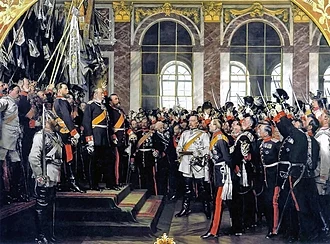Mark Antony's speech in Shakespeare's “Julius Caesar” is not ironic. Irony would imply the speaker and the audience being aware of the fact that what is being said is not true. But Antony wants the audience, after Brutus has just convinced them of the justice of Caesar's murder, to believe that he thinks like Caesar's murderers. “Caesar was my friend. But Brutus is an honorable man!”—Antony has promised not to take sides against Caesar's murderers and he does not. He merely argues their position so weakly that it collapses. That, of course, is no accident.
Only Nixon could go to China. Only social democrats can dismantle the welfare state. If education is the ability to question one's own view of the world, then its equivalent in action is the ability to storm one's own palace, i.e. the temporary or permanent ignoring of what gave one one's position in the first place, be it out of conviction or tactically. This is how you stay in power.
Artificial intelligence puts our democracy at risk. This is easy to say in times when, unlike in the 1920s, there is no relevant opposition either in parliament or outside it that is openly opposed to democracy. It sounds wonderfully dramatic, but the argument behind it is quite strange: artificial intelligence would generate masses of untruthful texts, images and videos that would make it impossible to distinguish between man-made and machine-made, between true and fake. As a result, information could no longer be trusted in the future. Information from the internet.
Really? You don't know whether to envy the naivety of those who argue in this way or whether to cry in despair. Everyone knows that information from the Internet cannot be trusted, even today and since the beginning of time. Anyone who doubts this is advised to use Twitter or Facebook. Artificial intelligence simply doesn't change this at all. You still can't trust information from the internet.
Written in November 2023 | Category: Technology
Of course, one would prefer to always choose the right choice. But in a contingent world, unfortunately, that's not so easy. Even what feels right at first can later turn out to be wrong. Whether the French Revolution was right remains to be seen, it is too early to judge, replied Chinese Prime Minister Chou En-lai in 1972—almost two hundred years after the event. The right thing is difficult to identify, but many variations of the wrong thing are all the easier to recognize. Therefore it remains nevertheless: The first heuristic is that of the distinction between right and wrong. There is a solution for every problem without cheating—in everyday life there usually are even several. However, once the solution range has been narrowed down, it becomes more complicated.
The second heuristic is that of usefulness: Among everything that seems right, there are those solutions that are additionally useful, they generate advantages in other contexts apart from the specific question, where other ways cause disadvantages. Of course, the former are preferable. But also in the useful there is contingency. The solution range is thus only further reduced, the decision remains open.
The third heuristic is left: that of beauty. Possibly the sun also rotates around the earth, but the mathematical equations for a rotation of the earth around the sun are the more elegant ones. And if one is honest to oneself, the decision about beauty is most often the simplest and clearest heuristic.
 In the Franco-Prussian War of 1870 to 1871, the mobilization speed of the Germans and the French was very different at the beginning of the war. The Prussian general staff succeeded in moving powerful units to the imminent front quite quickly thanks to sophisticated rail logistics and the joint transfer of troops and material. At the same time, chaos still reigned on the French side. Units could be moved only slowly from their home bases because of inadequate logistics, and of those that reached the border, many were still waiting a long time for weapons and ammunition.
In the Franco-Prussian War of 1870 to 1871, the mobilization speed of the Germans and the French was very different at the beginning of the war. The Prussian general staff succeeded in moving powerful units to the imminent front quite quickly thanks to sophisticated rail logistics and the joint transfer of troops and material. At the same time, chaos still reigned on the French side. Units could be moved only slowly from their home bases because of inadequate logistics, and of those that reached the border, many were still waiting a long time for weapons and ammunition.
This difference in mobilization speed could have had a significant impact on the outcome of the war. It did not, however. For one simple reason: the Germans would have had to be aware of it. They weren't. To the contrary, they assumed that the French would be just as fast as they were and therefore decided to play it safe. The French, in return, assumed that the Germans were just as slow as they themselves were, so there was no reason to worry. The first advance of the war came from the French: The militarily nonsensical and, for the weaker side, risky occupation of Saarbrücken. Prussia ultimately won the war by a decisively—mobilization was not the only area in which it was superior to the French. However, if the Germans had been able to exploit their faster mobilization, victory might have been achieved even more quickly and with fewer losses.
The mistake behind this, which affected Germans and French alike in 1870, is one we encounter many times today as well: In case of doubt, one assumes that the other side with which one is in conflict is just like oneself, equipped with the same capabilities and the same knowledge. Written down in such abstract terms, it is obvious that this is quite nonsensical. That two people or two companies have exactly the same skills and knowledge, that is unrealistic. Nevertheless, it is easy to fall into this assumption: in one's own overestimation of oneself (like the French) or in overestimation of the other (like the Germans).
That's why it's worth sitting down in front of a white sheet of paper every now and then to write down what you really know for sure about your counterpart—without thinking first and foremost about yourself.
 From Camus' “Myth of Sisyphus”, I have particularly taken a control question to throw it against theoretical-abstract interpretations of the world and strategy recommondations derived from them: And if it were so, what does that turn men into? That resonated with the computer engineer in me, who knows that above a certain level of complexity, you can no longer understand software line by line, but instead have to test and evaluate its output.
From Camus' “Myth of Sisyphus”, I have particularly taken a control question to throw it against theoretical-abstract interpretations of the world and strategy recommondations derived from them: And if it were so, what does that turn men into? That resonated with the computer engineer in me, who knows that above a certain level of complexity, you can no longer understand software line by line, but instead have to test and evaluate its output.
Whenever I sit in management seminars or read management literature, I throw this question back at the content. With unfortunately quite unsatisfactory results at the moment: the idea of man behind current management ideology seems to be quite consistently—despite different topics and approaches—one that conceives man as exclusively good (and good-natured). One would still face obstacles to live up to this—lack of acceptance of emotions or poor reflection on humanity or bad organization—but if these obstacles were overcome, then the good and right would always win (and companies would then, of course, be even more successful).
It is a thoroughly naive view of humanity that, confronted with Büchner's question of what it is in us that goes whoring, lies, steals and murders, can only turn away and cover its ears. This is interesting because the image of the classic manager is that of a rational decision-maker who cannot avoid a realistic image of man as a precondition for his rationality. The current management literature stands in fundamental opposition to this.
 In
In  From Camus' “Myth of Sisyphus”, I have particularly taken a control question to throw it against theoretical-abstract interpretations of the world and strategy recommondations derived from them: And if it were so, what does that turn men into? That resonated with the computer engineer in me, who knows that above a certain level of complexity, you can no longer understand software line by line, but instead have to test and evaluate its output.
From Camus' “Myth of Sisyphus”, I have particularly taken a control question to throw it against theoretical-abstract interpretations of the world and strategy recommondations derived from them: And if it were so, what does that turn men into? That resonated with the computer engineer in me, who knows that above a certain level of complexity, you can no longer understand software line by line, but instead have to test and evaluate its output.